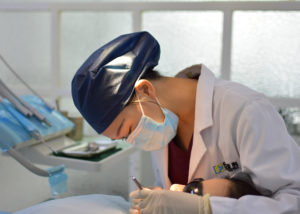Redundant Medicine When You Have No History
There’s a situation a lot of doctors are running into nowadays and it’s that they get a patient that shows up in the hospital and they don’t have their medical records. They’re either not local, they’re not in the system, and whatever. And you’re technically flying blind, is that correct?
That is correct. It can’t be more true what you just said.
And is this something that happens a lot. Do you see this frequently?
This happens on a daily basis.
Is this a big problem? What does it do to you as a physician that’s trying to keep people healthy?
The easiest way for me to explain this to you is to give you some examples. I work as a gastroenterologist and most of what I do is procedures including upper endoscopies and colonoscopies. What we get called in the most about is internal bleeding either from the stomach, somewhere in the small intestine or in the colon.
We had a gentleman come in. He told us that he was having a lot of black stool. Black stool is another word for what we call melena. It’s a sign that you’re probably bleeding from somewhere in your upper GI tract, but in either case, about 90% of the time it’s coming from somewhere in your stomach. This gentleman came into the hospital. He said he had had an episode like this before where he actually presented to another hospital about a month prior. He said he had to get scoped. He didn’t know necessarily any of the details associated with that and he said, “He thinks he might’ve had an ulcer.”
90% of the time this means it’s coming from somewhere in the stomach when we see black stool like he was having. Our team said, “Okay, let’s try and get the medical records from what was done at this outside hospital.” He gave us the information for that. However, this was on a Friday night. Medical records aren’t open a lot of times on Friday nights, nor Saturdays or Sundays. So, you’re waiting until Monday to get those reports a lot of times. And like you said, we’re sort of flying blind with what was performed at that time.
We did have pretty good gestalt as to what could be happening just based on his history and what we were seeing in front of us as this case was unfolding. So we go to do an upper endoscopy the next morning. He was stable enough to do so. We go to do the upper endoscopy, because we’re hedging our bets that in more than 90% of the time it’s going to be coming from somewhere in the stomach or the first part of the small intestine.
As we do the procedure, there was no active bleeding found in that side of the bowel. At that point, we’re forced to say, “Okay, well, we got to now go to do a colonoscopy on this gentlemen, because we have to look for a potential source for where this could be coming from, either now somewhere farther in the small bowel, or somewhere in the right colon, which is closer to the small bowel. And it could cause a presentation like this.”
Now, the difference between doing an upper endoscopy and a colonoscopy is that for a colonoscopy, you have to do a full bowel prep. This means you have to take a laxative that’s meant to clean you out completely. You can’t usually just do it as easily as an upper endoscopy where you don’t need that. So now we’re two and a half days into this guy’s hospitalization, because he came in on a Friday night. We decided to do the procedure on a Saturday, the upper endoscopy. And we plan to do the procedure now on a Sunday.
We do the colonoscopy after he was appropriately bowel prepped. And sure enough, in the right colon, he had a bleeding arterial venous malformation. These are rare things, but we see it frequently as a gastroenterologist. It’s not one of the common ones that a general internal medicine doctor might think of when they think of bleeding. They think of ulcers and stuff like that, or diverticulosis in the colon.
So sure enough, we treated it. We were able to do what we needed to do for this gentleman, essentially. And it stopped the bleeding. So now, this gentleman is two and a half days into his hospitalization for something that we could have done on the day before had we known that he had a history of this.
Low and behold Monday comes around and we finally are able to get access to the medical records. It turns out this gentleman, as he said, was scoped just a month ago.
And guess what? He also had had a colonoscopy that showed that he had a bleeding arterial venous malformation in the colon.
If we would have known that information, we would have done both procedures likely at the same time. We may have even considered just doing the colonoscopy to begin with. So, a hospitalization that could have been two days turned into four days.
Okay, yes, was he taking care of greatly? Did we do our job? Yes, we did our job. Did we do it as efficiently as we could have with the information we had at hand? Yes, we did. But had we had his medical records stating that he already had this problem, we would have been able to 1) not delayed his care, and 2) get him out of the hospital quickly which would have saved healthcare costs for him and to the medical system.
That’s a prime example and that happens daily in hospitals for gastroenterologists throughout America. There are more examples like this. Do you have some time for another one that I could tell you about George?
Yeah, yeah, please do.
Okay, well listen, so I have another case that’s a little bit different. Another emergency that we deal with as gastroenterologists is a bile duct obstruction. The bile duct is the organ that connects the liver to the small intestine. And usually what happens in obstructions is that you get some sort of gallstone stuck in that bile system. It can cause a pretty severe infection called cholangitis. The point is that this patient, he comes in and he had an ultrasound that showed that he had a biliary obstruction going on at that point.
So, we’re talking to him, “Hey, have you ever had a history of gallstones?” And he said, “As a matter of fact, yes. Many years ago, I did have an issue where I got an infected gallbladder and they had to take my gallbladder out. And there was a series of complications that came from it, but I can’t tell you what they were. I was pretty sick for a month in the hospital, but I got better from it. No issues ever since then.”
So, we had enough information. We had an ultrasound that showed obstruction. We looked at something called a bilirubin and that was going high. And we decided, “Hey, we got to do this procedure at this point?”
So, we go and do this procedure and when we get into the bowel his anatomy was completely variant from what normally you would see to get to that bile duct. We couldn’t find where the bile duct would normally drain. So we had to pull out of the procedure and send him urgently to our colleagues in our Interventional Radiology team. They do a special other type of procedure through the skin, not through the mouth, where they put a tube into the biliary system and they are able to stop the obstruction to alleviate the obstruction.
It gets better.
The whole point in this is that we were able to track down this guy’s medical records, roughly about a week later when we were able to talk to his spouse. What happened was, in this guy’s prior surgery, where they took out his gallbladder this surgery dealt with many complications. He had multiple areas of his small bowel that got diseased. He lost blood and they had to cut them out for different reasons. If we had known that before we considered doing the procedure, we would have likely just proceeded to abort and called in our colleagues that would have done the procedure through the skin to alleviate the obstruction.
It would have changed the approach that we had taken completely to treating this gentleman, who was by the way, in an emergency situation where we had to pretty urgently alleviate that obstruction. We would’ve called our colleagues in Interventional Radiology and they would have been able to do this much quicker at that point. And we wouldn’t have had to deal with any of the headaches of sedating this gentleman and possibly causing him to have a bad outcome since we didn’t have information at our disposal.
Now, I want to say that in both these cases, the patients did great from a clinical standpoint. They all did good, but I could tell you that there are countless times where minutes sometimes make a huge difference. And when you’re making decisions, split-second sometimes, you really need this information at hand.
There are countless other situations that other doctors and other specialties have to deal with. But I can tell you that those are two instances that I completely remember where I was like, “If I would’ve just had these records beforehand, I would have been able to make an optimal medical decision to treat this guy, or these patients beforehand.” And it would’ve made a difference in their care.



